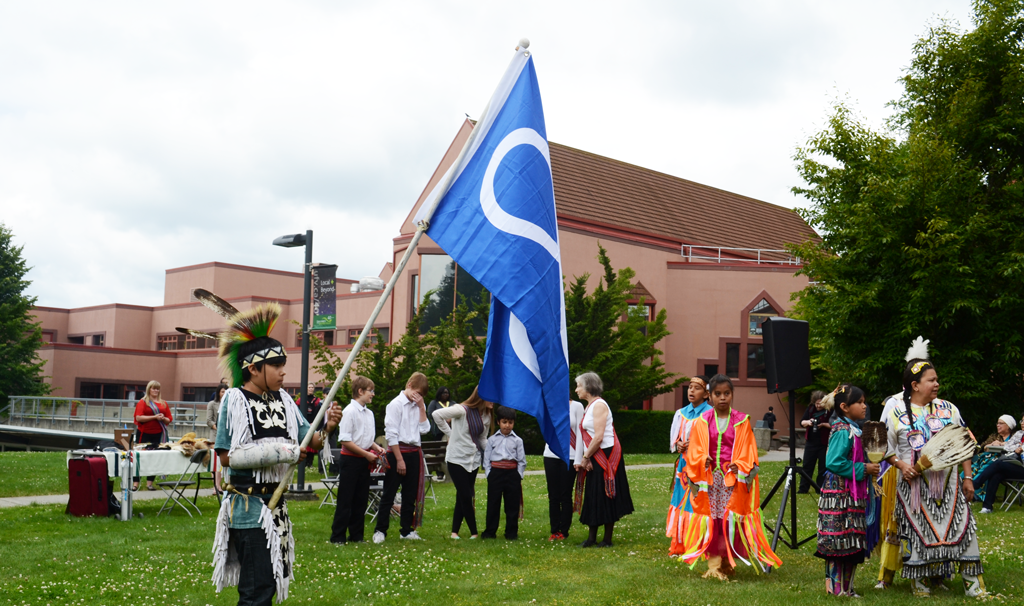By Kier-Christer Junos (Community Contributor) – Email
Print Edition: July 2, 2014

Stó:l? drums beat in celebration of UFV’s new graduates, they beat at convocation as the registrar walked out, and they beat again during the Aboriginal Awareness Day event on the Green June 17.
Conjuring the Earth’s heartbeat in traditional First Nations song was only one of many things onlookers enjoyed at the event. Métis and Stó:l? dancers jigged and twirled on the green, UFV elders blessed the afternoon in their respective languages, and of course, organizers served food — bannock, most notably.
All these were part of an important celebration that highlighted First Nations culture.
[pullquote]“The intent of Canada was to totally assimilate First Nations people … but we’re still here.”[/pullquote]
“The intent of Canada was to totally assimilate First Nations people and bring them into the general body politic of Canadian society — but we’re still here,” said Eddie Gardner, one of UFV’s elders in residence who works in the Aboriginal Access Centre. “As you can see, on Aboriginal Day, we celebrate our culture. We celebrate our philosophies, our songs, our dances, our history, our stories, and our languages. There’s such a beautiful renaissance of who we are as First Nations people nowadays.”
The afternoon event started with a prayer by Gardner, followed by a powwow grand entry, where Métis dancers walked out onto the Green bearing their flag. Later, the Métis dancers encouraged attendees to join their dancing, and organizers conducted a door prize draw. Aboriginal crafts and artwork lay on tables for all to peruse.
Last year, Aboriginal Peoples representative Ashley Camille explained the need for an aboriginal awareness event to The Cascade. These days, approximately 400 UFV students identify as aboriginal, and the initial intent for the event was to bring UFV’s aboriginal students together.
Theresa Neel, also an elder in residence, talked about the importance of bringing First Nations students to post-secondary education.
“I was a student when Fraser Valley College first opened in 1974,” said Neel. “I was a high school drop-out. And the college changed my life. I never thought I would work in a university — because of course it’s one of the highest pinnacles within the white society.” Neel, whose lineage branches from prolific aboriginal artists like Mungo Martin, has received an offer to lecture about her mother’s art at SFU.
[pullquote]“We hold some legal grounds to make it necessary for government and industry to consult with aboriginal people before they proceed with major developments.”[/pullquote]
Besides celebrating First Nations culture, the event highlighted another important aspect First Nations people want all Canadians to understand: reverence and responsibility for the land. Few First Nations bands in BC hold ratified treaties. With UFV’s campus sitting on unceded Stó:l? territory, First Nations people appreciate UFV’s acknowledgement.
“I’m a guest here, too,” said Morris Prosser, fourth-year student and president of UFV’s aboriginal student association. He identifies with a different band. “I think that it’s great that the university is here, but also that they also acknowledge that this is unceded Stó:l? territory. I think that’s a great concept and I applaud the university for doing that.”
Canada is rich in natural resources — the net exports of our country’s economy depend on such endowments. But Canadians — including First Nations people — have been ethically divided when it comes to harvesting resources. Gardner explained how First Nations people often spearhead efforts to protect the Earth (take last year’s October protests against fracking for shale gas in New Brunswick, for example). When it comes to the major development plans of governments and corporations, Gardner added that First Nations people have achieved more agency in how such plans are conducted.
“We’ve been able to establish ourselves in Canada by ensuring that our aboriginal rights are included in the Canadian constitution,” said Gardner. “We hold some legal grounds to make it necessary for government and industry to consult with aboriginal people before they proceed with major developments.”
This month, the Conservative government approved the Northern Gateway Pipeline Project, and First Nations people are “overwhelmingly opposed,” according to a release from the Assembly of First Nations on June 17. Gardner hopes governments and citizens will come to an epiphany; he wants people to reject a scorched-earth policy and ultimately adopt an attitude of sustainability.
“My prayer is that we do share this territory with great reverence, and also great responsibility to take care of it,” said Gardner. “For that is what our ancestors have told us to do. We need to take good care of everything that belongs to us and we need to learn to live together in a good way.”


